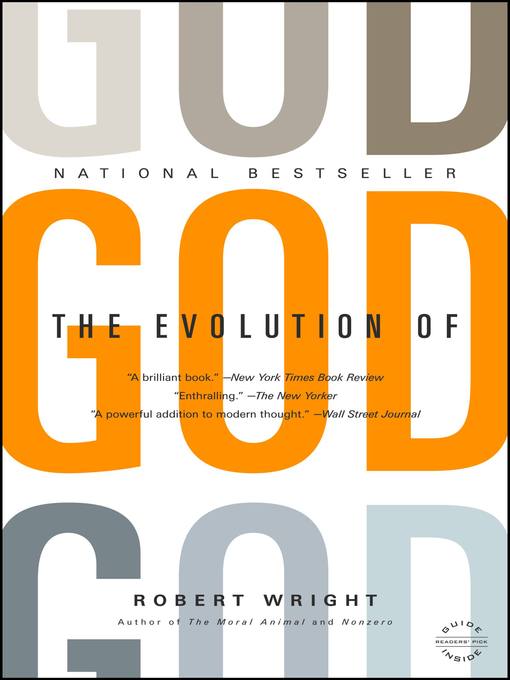
The Evolution of God
کتاب های مرتبط
- اطلاعات
- نقد و بررسی
- دیدگاه کاربران
نقد و بررسی

September 28, 2009
Wright's brief reveals why religious and scientific beliefs do not have to be mutually exclusive. While his history of monotheistic religions is accessible, if not illuminating, his game theory approach to God and religious coexistence and harmony is dense and difficult to process aurally. Arthur Morey delivers a flat and monotonous reading. While he does inflect, his projection lacks the emphasis and energy to sustain listeners through all 19 hours of this production. A Little, Brown hardcover (Reviews, May 11).

May 11, 2009
In his illuminating book, The Moral Animal
, Wright introduced evolutionary psychology and examined the ways that the morality of individuals might be hard-wired by nature rather than influenced by culture. With this book, he expands upon that work, turning now to explore how religion came to define larger and larger groups of people as part of the circle of moral consideration. Using a naïve and antiquated approach to the sociology and anthropology of religion, Wright expends far too great an effort covering well-trod territory concerning the development of religions from “primitive” hunter-gatherer stages to monotheism. He finds in this evolution of religion, however, that the great monotheistic (he calls them “Abrahamic,” a term not favored by many religion scholars) religions—Christianity, Islam, Judaism—all contain a code for the salvation of the world. Using game theory, he encourages individuals in these three faiths to embrace a non–zero-sum relationship to other religions, seeing their fortunes as positively correlated and interdependent and then acting with tolerance toward other religions. Regrettably, Wright's lively writing unveils little that is genuinely new or insightful about religion.

April 15, 2009
Wright (Nonzero, 2001,etc.) joins the decade 's bandwagon with a tome explaining away God as something people made up over time.
Focusing on the monotheistic,"Abrahamic" God of Judaism, Christianity and Islam, the author trains his critical eye and evolutionary insight on the Bible and Koran and what they represent. In opposition to the Talmudic accounts of Abraham, Moses and other patriarchs, Wright sees a faith adapted by an indigenous people from polytheistic roots for social and even political reasons."Apparently Abrahamic monotheism grew organically out of the 'primitive '[religion]by a process more evolutionary than revolutionary," he writes. Extant scriptural accounts are the work of layer upon layer of editors who slowly turned polytheism into monotheism to serve the purposes of the times. None of this is particularly new; what Wright adds is his own language about how God, or rather our view of God, changes morally over time."Monotheism turns out to be, morally speaking, a very malleable thing," he writes."Circumstances change, and God changes with them." For instance, Wright argues that Jesus as most people know him, and indeed as the New Testament presents him, is very different from the"historical Jesus" gleaned by scholars from analysis of the texts. This argument has been gathering force for nearly a century, but the author adds an analysis of how supposed additions to Jesus' teachings came about due to moral issues faced by his later followers. Namely, preachers such as Paul wanted the movement to grow, and therefore ascribed to Jesus a love of all peoples and a universal mandate for evangelism."Traditional believers," as Wright calls them, will find all this a difficult pill to swallow, but they do not appear to be his intended audience.
Offers little new scholarship, but the in-depth approach yields original insights.
(COPYRIGHT (2009) KIRKUS REVIEWS/NIELSEN BUSINESS MEDIA, INC. ALL RIGHTS RESERVED.)

July 15, 2009
While the diatribes of the "new atheists"Richard Dawkins, Sam Harris, and company have made headlines in recent years, Wright ("The Moral Animal,Nonzero") takes a decidedly more friendly approach to human religiousness. Although he shares their materialist, naturalist assumptions, he argues that over time human notions of God have "gotten closer to moral and spiritual truth].Religion hasn't just evolved, it has matured." Making the best recent scholarship accessible to the general reader, Wright follows the historical trajectory from polytheism through monolatry (worship of one god among many) to monotheism, focusing primarily on the evolving vision of God in the Hebrew Bible, the New Testament, and the Qur'an, and ending with a discussion of religion's place in human evolution. In his focus on scriptures, Wright avoids the philosophical terrain covered more intently in Karen Armstrong's "The History of God" and "The Great Transformation". VERDICT Wright's approach will appeal to a broad range of readers turned off by the "either/or" choice between dogmatic atheism and religious traditionalism. Recommended for all readers engaged in consideration of our notions of God.Steve Young, McHenry Cty. Coll., Crystal Lake, IL
Copyright 2009 Library Journal, LLC Used with permission.

























دیدگاه کاربران